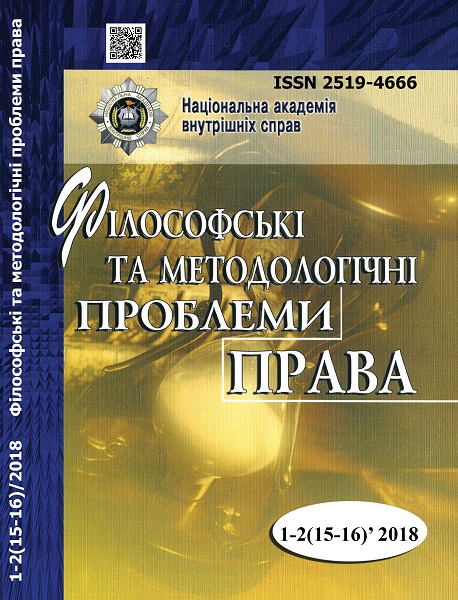Gnosiology of Law as the Constituent Part of Philosophy of Law (General Thoughts)
Abstract
The dialectical interrelations of legal gnosilogy as a component of the philosophy of law along with its other components – legal ontology, anthropology, praxiology and axiology are studied. The relationship of legal epistemology with legal ontology is shown. On the one hand, cognitive processes in law are the part of the sphere of legal existence, as they exist. In general, the act of cognition is an ontological act in the sense that it occurs in reality. Many researchers include legal ideas, concepts, and theories into the legal reality. On the other hand, ontological and legal knowledge is acquired through methods and approaches that are developed by legal gnosiology, taking into account the achievements of philosophical gnosiology. Mutual connections of legal gnosiology with legal anthropology are disclosed in the conclusionsof the article. The entire content of legal anthropology is the product of legal (and general) knowledge and, at the same time, legal knowledge is the function of a human being as a legal one, in this respect, legal gnosiology acts as an integral part of legal anthropology. The conclusion is grounded on the fact that legal gnosiology is organically linked with legal praxiology – cognitive activity in the legal sphere is an integral part of legal activity in general, and the theory of legal activity is the result of the corresponding cognitive procedures. It is shown that legal gnosiology is organically connected with the legal axiology as a doctrine of the value aspect of law.Attention is focused on the question of the criterion of value. This criterion is the truth, the study of which occupies a central place in legal gnosiology (so as in general gnosiology).
The problem of truth is also the area of intersection of legal gnosiology with legal ontology, anthropology and praxiology. Consequently, legal gnosiology has dialectical links with other philosophical and legal disciplines and is an integral part of the philosophy of law.
Downloads
Abstract views: 1538 PDF Downloads: 4114
Copyright (c) 2019 Philosophical and Methodological Problems of Law

This work is licensed under a Creative Commons Attribution-NonCommercial-NoDerivatives 4.0 International License.
- Authors reserve the right to authorship of their own work and transfer to the magazine the right of the first publication of this work under the terms of the Creative Commons Attribution License, which allows other persons to freely distribute published work with mandatory reference to authors of the original work and the first publication of an article in this magazine.
- Authors have the right to enter into separate additional agreements on non-exclusive dissemination of the work in the form in which it was published in the journal (for example, to post an article in the institution's repository or to publish as part of a monograph), provided that the link to the first publication of the work in this journal is maintained.
- The journal's policy allows and encourages the posting of articles by authors on the Internet (for example, in electronic storehouses of institutions or on personal websites), both before the submission of this manuscript to the editorial office and during its editorial processing, as this contributes to the creation of a productive scientific discussion and positively affects the efficiency and dynamics of citing the published work.




